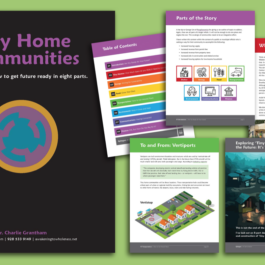What are the top 10 trends for the next ten years? Download the report here.

^^That photo up there? It’s the largest radio telescope ever built, more than 30 football fields large. Why am I showing you this signal-hunting device with 5–10X more potential to discover alien civilizations? Because I have a question:
What signals are you picking up?
Your ability to detect signals is critical to making sense of what’s going on around you.
And your ability to make sense is critical to anticipating and imagining brighter futures.
And that’s your job as a futurist, visionary, leader, and change agent: to make things better.
How do you do develop your radar?
We’ll get to that. First, let’s remember what we're looking for: signals.
“[…] signals of the future are all around us. Often these are things or developments that are on the margins. They may look weird or strange. They are the kind of things that grab your attention and make you ask: ‘Why is this happening? What is going on here?’ A signal can be anything. It could be a technology, an application, a product/service/experience, an anecdote or personal observation, a research project or prototype, a news story, or even simply a piece of data that shows something different.”.
~Marina Gorbis (a personal hero), Institute for the Future
“Five Principles for Thinking Like a Futurist”
Three questions to help you locate signals
- What’s happening on the margins of your domain? Who are the true innovators in your field, and what are they working on? What's getting disrupted?
- What strikes you as odd?
- What’s grabbing your attention and making you ask, “What’s going on here?”
Three capabilities to refine your radar
- Read widely and deeply. Preferably, not the news. Some alternatives: the list of resources we recommended to our 2020 Futurist Campers (notice the breadth), and their first reading assignment (notice the depth.) The point? Use your big, beautiful brain to think more widely and more deeply about the world around you.
- Talk frequently with folks who are younger than you, older than you, different from you. Don’t talk about the weather. Ask, “What are you noticing?” or “What are you working on now, that's exciting?”
- Put your phone down. Learn to keep your phone in your pocket or out of sight. Take yourself (or your kids or dogs) on walks without your earbuds in. Be present to what’s happening around you. Just notice. Stay with it. This allows your beta waves to come online and make connections. Humans have good ideas in the shower because they’re alone in there.
How do futurists use signals?
In my experience, signals — like delicious meals — are best shared. I regularly gather with local government nerds for a "Signals and Sensemaking" panel. It's simple, just two rounds of discussion:
Round 1: Everyone shares a couple of signals they’ve picked up since the last time we met. We track our signals in a google doc.
Round 2: Everyone takes a turn riffing off each other's signals to connect the dots, anticipate what the signals may be telling us, and ask deeper questions.
This is one of the most valuable meetings I have each week because my viewpoint is always expanded. It’s simple to execute, costs nothing, and is valuable to everyone who attends.
Here’s a sample of signals my group shared in fall 2020:
- Local governments across the U.S. will experience up to 40% loss in revenue due to COVID-19. Implication: in previous recessions, “nonessential” services like parks and recreation are cut first, followed by cuts to education and public health.
- There has been a 39% increase in the percent of uninsured, the largest increase ever recorded. Also, returning workers may bring drug and alcohol problems back with them to work. Source: Business Insurance magazine (subscription required)
- Curing addiction? Researchers have figured out how to “erase” memories that lead to drug relapse. Implication: We may never win the war on drugs, but maybe science can help users get clean and sober.
- Cities, local hospitals, and school districts declare racism a public health issue. This is already backed by the public health and medical communities, paving the way for policy reform.
- Former Fed Chairs Bernanke and Yellen advise investments in public health as an economic balm. Will public health finally get the funding it deserves?
- Big banks are setting aside billions of dollars, anticipating loan defaults. Also, most economists are now anticipating a mortgage meltdown.
- Cyber mercenaries-for-hire are hijacking routers and disrupting websites and online services at record-setting rates. Implication: arms race in cybersecurity.
- Australian university discovers a blood test that can detect COVID-19 in 20 minutes. No more waiting 5–10 days for test results!
Other examples of sensemaking
- Make Me Smart with Kai Ryssdal and Molly Wood. Each reporter brings one or two media stories and discusses them together. On Fridays, they meet while drinking a beer. (Nice touch, you two.)
- A well-run panel — where participants disagree with each other, but the conversation is generative, not destructive — can be good examples of sensemaking. The acid test is “Did anyone learn anything from the conversation?” If YES, congratulations. If NO, this was probably an unfulfilling rehash of everyone’s talking points.
Signals and sensemaking webinar:
If you enjoyed this post, please subscribe to our newsletter.

Rebecca Ryan, APF
Rebecca Ryan captains the ship. Trained as a futurist and an economist, Rebecca helps clients see what's coming - as a keynote speaker, a Futures Lab facilitator, an author of books, blogs and articles, a client advisor, and the founder of Futurist Camp. Check out her blog or watch her Q&A on how NGC helps organizations prepare for the future using Strategic Foresight. Contact Lisa Loniello for more information.
Yasemin Arikan Promoted to Director of Futures Research
NEXT Generation Consulting (NGC) announced the promotion of Yasemin Arikan to Director of Futures Research. Arikan will lead the company’s efforts to...
Is Your Housing Market Ready for Your Future?
One of the biggest problems facing many cities and towns is inadequate housing. This problem is most acute for seniors, veterans with disabilities, and low-income groups ...
Three Things Martha Stewart Gets Right About Return to Office (RTO)
The original influencer and the person who invented the "Home" retail category, Martha Stewart, became the latest CEO to tell employees to get back to the office five day...







